WHO supporting the early warning, alert and response network in north-west Syria
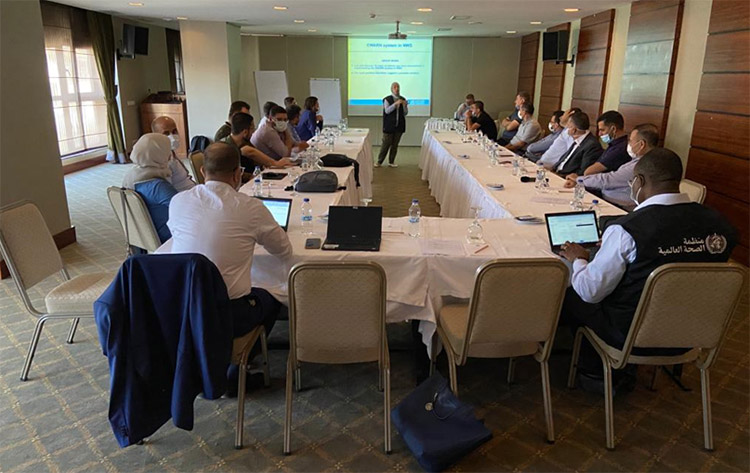
21 October 2021 - Last week, an EWARN training was conducted in Gaziantep, Turkey by WHO’s Field Presence Office, with kind support by WHO EMRO. The EWARN training was supported by Technical Officers from WHO EMRO for two weeks and culminated in a 3-day event held in Gaziantep. The overall goal of the training was to aid and teach Country Level Operators (CLO) working across the border in conflict-torn northwest Syria, in responding to outbreaks. The training focused on teaching methods of EWARN surveillance and rapid response, capacity building of skills needed in the field, investigating outbreaks, support colleagues and communities to handle and react to outbreaks as well as teaching the practice of immediate response activities. By doing so, CLO would have the knowledge and know-how to react to an outbreak in the region and determine a local level responsibility for outbreaks, to reduce spread and mortalities. With this training WHO hope’s that the CLO then will spread this information on to other partners, through workshops and information, across the border in northwest Syria.
The transnational event drew on the experience of over 20 doctors and medical workers and set about addressing disease surveillance procedures and early identification of cases and clusters for rapid containment. WHO spoke about how inadequate diagnostic capacity, insufficient contact tracing, fragmented data systems, incomplete data insights for public health responders, and suboptimal governance affect the control of an outbreak. Thus, at the training, WHO reviewed the performance of EWARS and its effectiveness and usefulness in detecting, confirming, and responding to priority diseases, as well as jointly reviewing the rapid EWARN team capacity and operation and assessing its structure within the emergency operating process. By doing so, the EWARN team were able to build frontline workers' and field team members' capacities to respond effectively and efficiently to a public health alert or outbreaks.
Outbreaks covered were as follows: Acute Bloody Diarrhea, Acute Flaccid Paralysis, Acute Jaundice Syndrome, Acute Watery Diarrhea, Immunoglobulin deficiencies, Influenza Like Illness, Leishmaniasis, Measles, Meningitis, Other Acute Diarrhea, Severe Acute Respiratory Illness, Brucellosis, SARI, Impetigo, Scabies, Chickenpox, Lice, Pertussis and Influenza.
After the EWARN training concluded all partners would return to country and be able now to confidently engage with high-risk communities, and apply knowledge of their customs and cultural norms to response efforts, as well as coordinate and communicate effectively with all relevant partners and stakeholders, including focal points for the animal-human interface. WHO would like to thank all participants and to wish them all the best in the future as they in turn ensure knowledge transfer, including short- and long-term recommendations, to other key stakeholders in northwest Syria.
WHO Taskforce helps dialysis units in Northwest Syria
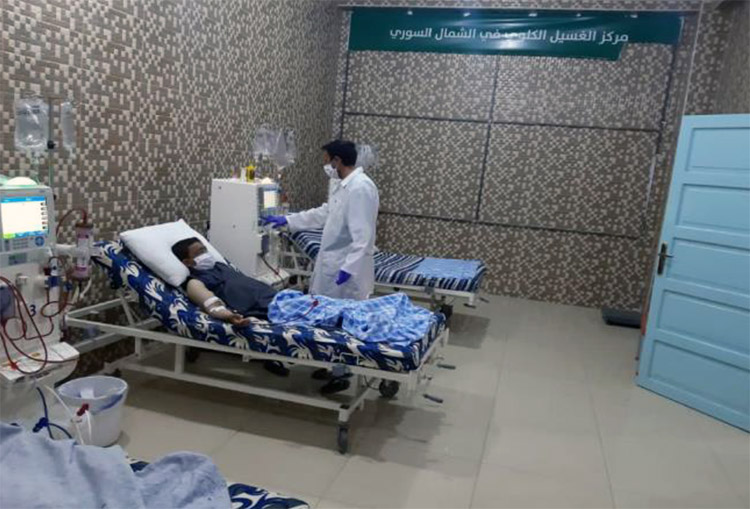
16 October 2021- Generated in response to the coordination needs between the multiple NGOs managing dialysis units in northwest Syria, WHO’s Dialysis Taskforce was established by the Health Cluster as an emergency project with Johns Hopkins University, Baltimore, USA, to analyze long-standing deficiencies, problems and challenges in hemodialysis units in the area, and develop and implement a series of activities to improve the quality of services for patients.
Health services in northwest Syria suffer from a lack of staff, equipment, medicine and consumables, as well as funding for operational and running costs. While maintaining access to general primary and secondary healthcare is the main objective of the humanitarian response, providing access to specialized healthcare -- especially for chronic conditions -- remains the principal challenge in a continuously changing context.
An estimated 600 patients, at least, receive hemodialysis treatment in northwest Syria. A variety of NGOs run 14 dialysis units with limited supervision from specialists. Five additional units operate in the Turkish-controlled areas to the northeast. While WHO provides kits, medicines and technical supplies to many of these NGOs at an estimated cost of $1.5 million a year, some are presented by NGO individual donors, while others still arrive through the Consolidated Appeal Process (CAP). The supplies delivered to WHO are rapidly passed to the NGOs, who store them in their warehouses in Syria.
Reports have detailed that the human and material resource capacity in dialysis units are limited, physical infrastructure is lacking, and major problems with infection control are common. Minimum defined standards for supply, process, and quality of care for dialysis units are lacking. Furthermore, the unit locations and consequent distances limit patient access.
The findings of assessments conducted by the Dialysis Taskforce on dialysis needs/services in the Idlib and Aleppo governorates in 2019 and 2020 revealed high levels of viral infections, lack of infection prevention and control (IPC) measures and minimum quality standards in practice.
The data collection process is ongoing for the quality improvement assessment. A technical team of two doctors from Johns Hopkins University arrived to Gaziantep on 16 October, 2021 to support in analyzing the data and present the results at a workshop.
Recommendations found were the need for centering on creating a series of standards appropriate to northwest Syria in the areas of patient, care, laboratory testing, record keeping, and equipment maintenance which will define the function of hemodialysis units under circumstances specific to the area. A strong emphasis in these standards will be IPC, consistent with the WHO hospital IPC standards.
WHO Gaziantep extends its gratitude to all workshop attendees, particularly to Dr Gilbert and Dr Samee of Johns Hopkins University, Baltimore, USA.
For more information, please contact:
Grattan Lynch
Communications Officer
E-mail:
WHO alleviates human suffering in northwest Syria
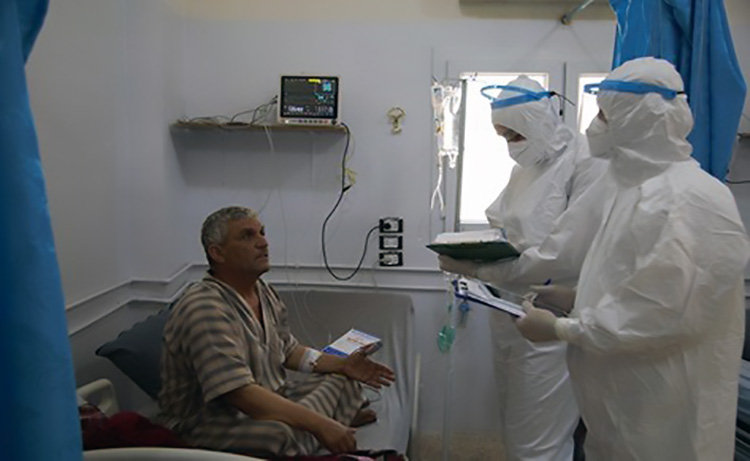
20 September 2021- The onset of COVID-19 has further challenged the already exhausted healthcare system in countries of conflict such as Syria. To prevent its collapse, the WHO has unremittingly supported Syria’s healthcare system - whether before the emergence of COVID-19 or since -- by providing supplies and ensuring access to healthcare. Meet some of the Syrian people who found care and treatment in Dana Hospital, one of many receiving WHO’s support to continue functioning.
Originally from Al-Lataminah -- a town in northern Syria’s Hama Governorate -- Abdul Karim Al-Naasan, 73, was displaced to the north of Idlib, in the overcrowded Deir Hassan camps notorious for their lack of healthcare services. When his health weakened noticeably, the elderly man was admitted to one of the region’s isolation centers where he had tested positive for COVID-19 infection.
During his stay at the center, his condition deteriorated further due to severe hypoxia, forcing his transfer to Dana Hospital where he could receive the necessary treatment, including oxygen. There, a specialized medical team closely monitored Abdul Karim’s health and implemented a precise treatment plan until his successful recovery.
Abdul Latif Ibrahim Al-Mahmoud, another 73-year-old, recounted: “I was displaced from Morek. I went to Dana Isolation Center after symptoms appeared 15 days ago. There is no weariness, no worry, thank God, because the staff is always there. I am well.”
“I experienced a problem with my breathing five days ago,” said Khalidiya Hussein Sarhan, 55 years old, “I was taken to the clinic and then to the isolation center located in Dana, where they told me that I was infected with COVID-19. The services are good here and I feel at home. I was given the appropriate treatment and oxygen. I’ve been here for seven days now and I feel fine.”
Also in his 70s, Ahmed Duraii Ramadan was transferred from Al-Quds Hospital after the onset of fatigue: “I was moved to Dana Hospital for isolation once I was diagnosed with COVID-19. I say it in all honestly: I received special treatment for more than 15 days at Dana Hospital and have not found similar care anywhere else. Everyone treats me like a father. Even the food is good. Frankly, I feel very much at home and I thank all those in charge of this great work.”
Located in the conflict zone of northwest Syria, Dana Hospital exists without a Ministry of Health to support or manage it. Furthermore, the hospital operates within a region with scores of nearby Internally Displaced People (IDP) Camps at full capacity and is therefore under tremendous strain to provide healthy conditions for persons of all ages.
The WHO’s support of Dana Hospital allows it to maintain proper operation, saving lives every day in northwest Syria. WHO relies graciously on funding via a multi-donors’ approach from ECHO and USAID to support such Primary Health Centers as Dana Hospital.
For more information, please contact:
Grattan Lynch
Communications Officer
E-mail:
Improving lives in northwest Syria with support from ECHO
1 August 2021 – Each month we present some human interest stories about people whose lives have been changed thanks to the generous and continuous support of the European Civil Protection and Humanitarian Aid Operations (ECHO) and the relentless dedication of our partners on the ground in northwest Syria.
The story of Um Khaled and her experience with depression disorder
Um Khaled is 42 years old and was displaced from the Damascus countryside to Idlib. She has been divorced for a long time and her daughter lives far from her and her other child has been living with his father since the divorce. She is currently living alone in her friend's house without any privacy, far from all her family members who all live in and near Damascus. She has no relatives in Idlib and was displaced there due to the conflict.
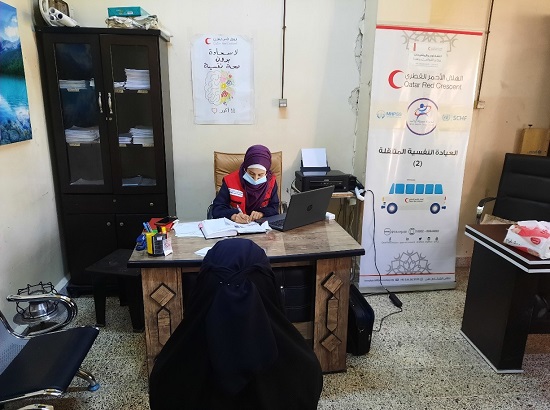
For more than 7 months, Um Khaled had suffered from symptoms of chest tightness, headaches, sleep disturbance, and a lack of interest in daily activities. Also, her bad financial status increased the severity of her symptoms and she was always crying and generally in a heightened state of depression. One day, she took action to visit the mobile clinic run by the Qatar Red Crescent Society and supported by WHO through the ECHO fund.
At the centre, the psychosocial worker developed a comprehensive approach and established an appropriate care plan for Um Khaled to reduce the severity of her client’s psychological symptoms and provide psychosocial support to improve overall well-being and resilience. The psychosocial worker implemented interventions to achieve these goals that focused on providing psychoeducation to her client about depression, its symptoms and how to deal with them. She also communicated with the client’s friend and her family (the only trusted people in displacement) and engage them in the psychosocial support programme and referred her to a women's centre to help her engage in the programme and empowerment activities.
Due to the ECHO fund that enabled WHO to support the mobile clinic, the life of Um Khaled has dramatically improved and her outlook on life has become more positive and focused. Um Khaled’s depressive symptoms were reduced after she received mental health and pyschosocial interventions and her social status improved. Also her friend succeeded in resolving the marital dispute between her and her husband as she has since been granted access to see her young child. We are also very happy to report that she has become a seamstress after engaging in empowerment activities in the women's centre and is now able to work and support herself.
The story of Abdullah and his experience with psychosis disorder
Abdullah is 37 years old has been separated from his wife for the past 4 years due to a worsening psychological condition. He lives in the Aleppo countryside with his widowed mother and his married brother, who has 3 children and they live in a very basic house that is not really inhabitable.
After his separation from his wife, he started to experience strange symptoms and behaviours. He became afraid of many things, sometimes even the sound of people's voices, and a state of nervousness, panic, anxiety and tension overcame him. He started to isolate himself so he quit his job and he refused to leave his house. As a result, his economic situation declined and his problems multiplied. The severity of his condition and symptoms worsened. He began to suffer from auditory and visual hallucinations and started clinging to false beliefs and delusions. He slowly became addicted to captagon pills.
Abdullah’s mother heard of the mobile mental health clinic in their place of residence, so she visited the clinic asking for assistance. The psychosocial worker developed a comprehensive approach and established an appropriate care plan to reduce the severity of his psychological disorder and provide psychosocial support for the other family members. Abdullah was referred to the mental health hospital in Azaz because of the severity of his disorder
The psychosocial worker implemented interventions to provide psychoeducation for the client's family (mother and older brother) about the psychological disorder and the client’s needs during the period ahead. He also set about providing psychological support to the mother to deal with her symptoms of distress that included severe crying and fatigue and referred the family to a organization which provides shelter services to improve the conditions of people's houses. Also, the psychosocial worker referred the children of the older brother to an organization that provides child protection services because risks were identified among the children.
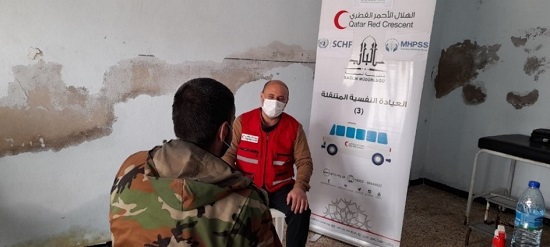
The effect of such treatment was astounding and has changed the life of Abdullah and his whole family and within a month in Azaz hospital his psychotic symptoms were greatly reduced. His health improved as too did the health and psychological status of his mother. The house that they lived in underwent improvements with support from the organization. The children of his brother too have benefited and are now all safe and functional and back at school.
Due to the ECHO funds that enabled WHO to support this mobile clinic, the life of Abdullah and his immediate family have become more hopeful and he is slowly regaining calmness and serenity. Abdullah’s case was one of the more extreme cases of mental health disorder and we are very pleased to announce that due to ECHO’s continual support to WHO and this mobile clinic, both he and his family are living in a healthy and happy home, with bright visions of the future.








